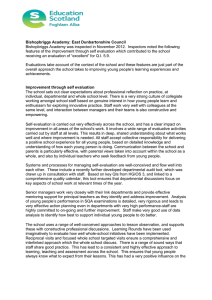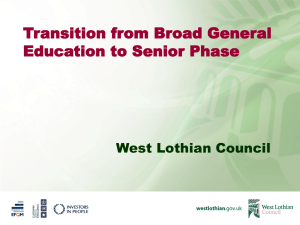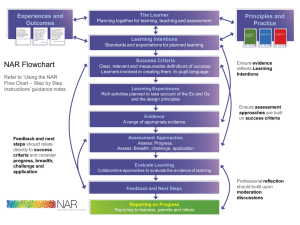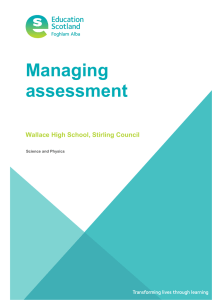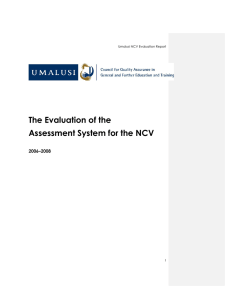Evaluating and Improving our Curriculum S1-S3
advertisement
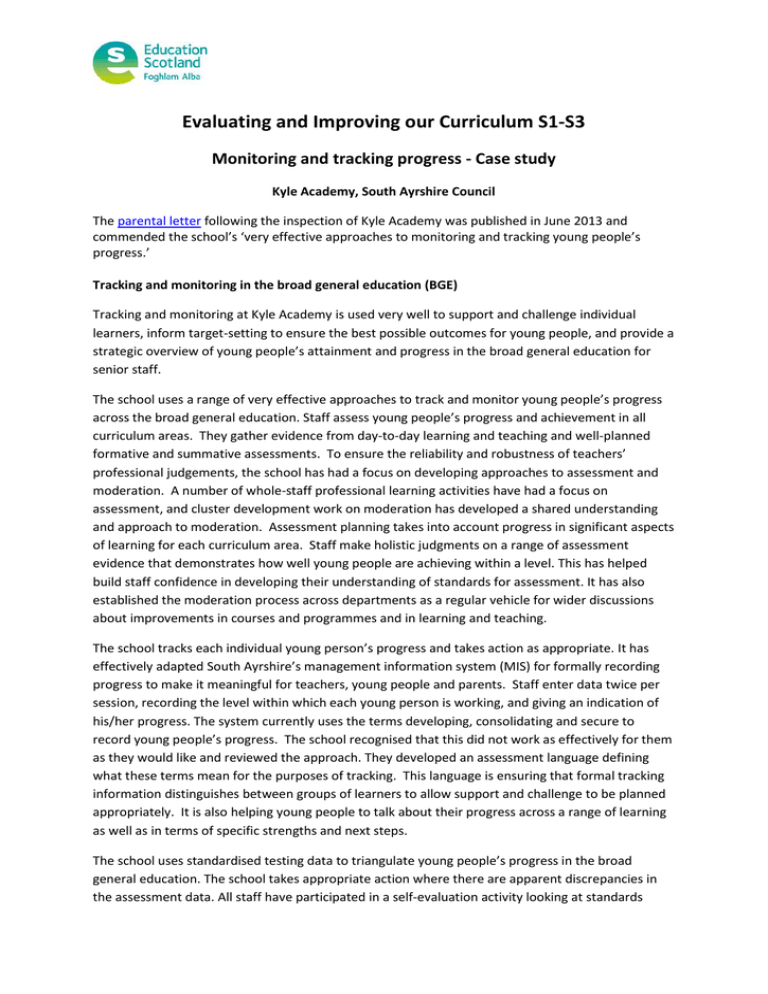
Evaluating and Improving our Curriculum S1-S3 Monitoring and tracking progress - Case study Kyle Academy, South Ayrshire Council The parental letter following the inspection of Kyle Academy was published in June 2013 and commended the school’s ‘very effective approaches to monitoring and tracking young people’s progress.’ Tracking and monitoring in the broad general education (BGE) Tracking and monitoring at Kyle Academy is used very well to support and challenge individual learners, inform target-setting to ensure the best possible outcomes for young people, and provide a strategic overview of young people’s attainment and progress in the broad general education for senior staff. The school uses a range of very effective approaches to track and monitor young people’s progress across the broad general education. Staff assess young people’s progress and achievement in all curriculum areas. They gather evidence from day-to-day learning and teaching and well-planned formative and summative assessments. To ensure the reliability and robustness of teachers’ professional judgements, the school has had a focus on developing approaches to assessment and moderation. A number of whole-staff professional learning activities have had a focus on assessment, and cluster development work on moderation has developed a shared understanding and approach to moderation. Assessment planning takes into account progress in significant aspects of learning for each curriculum area. Staff make holistic judgments on a range of assessment evidence that demonstrates how well young people are achieving within a level. This has helped build staff confidence in developing their understanding of standards for assessment. It has also established the moderation process across departments as a regular vehicle for wider discussions about improvements in courses and programmes and in learning and teaching. The school tracks each individual young person’s progress and takes action as appropriate. It has effectively adapted South Ayrshire’s management information system (MIS) for formally recording progress to make it meaningful for teachers, young people and parents. Staff enter data twice per session, recording the level within which each young person is working, and giving an indication of his/her progress. The system currently uses the terms developing, consolidating and secure to record young people’s progress. The school recognised that this did not work as effectively for them as they would like and reviewed the approach. They developed an assessment language defining what these terms mean for the purposes of tracking. This language is ensuring that formal tracking information distinguishes between groups of learners to allow support and challenge to be planned appropriately. It is also helping young people to talk about their progress across a range of learning as well as in terms of specific strengths and next steps. The school uses standardised testing data to triangulate young people’s progress in the broad general education. The school takes appropriate action where there are apparent discrepancies in the assessment data. All staff have participated in a self-evaluation activity looking at standards across the school. Reflective questions around a range of quantitative data (including standardised test scores and teacher assessment judgements over time) generated discussion which was particularly effective in developing staff understanding of national standards and developing higher expectations of what young people can achieve at the BGE phase. Tracking information is analysed at whole-school level and used in a proactive way to avoid underachievement and celebrate success. The school addresses concerns through a range of appropriate intervention strategies to ensure young people are making appropriate progress and their needs are being met. Young people at risk of underachieving are identified at an early stage and support strategies such as mentoring or family clinics are initiated to address this. Teachers can compare the performance of young people in their department to that in other departments across the school. The school is also using tracking information to analyse performance at whole-school level. This is effectively supporting target-setting and an understanding of what the school’s expectations of progress should be to ensure the most effective transitions to the senior phase. The school is using monitoring and tracking well to plan progression for individual learners and for cohorts. For example, they have considered what the S3 curriculum looks like for learners who are not secure at third level by the end of S2 to ensure that they continue to build key learning while specialising within curricular areas. The senior leadership team analyses the performance of individual departments and identifies trends and patterns. Sharing this at whole school level is supporting self-evaluation at department level. Departments use the data to evaluate how well they are meeting the needs of young people in terms of appropriate challenge and expectations. They also use it to evaluate the impact of courses and programmes in raising standards of attainment.
